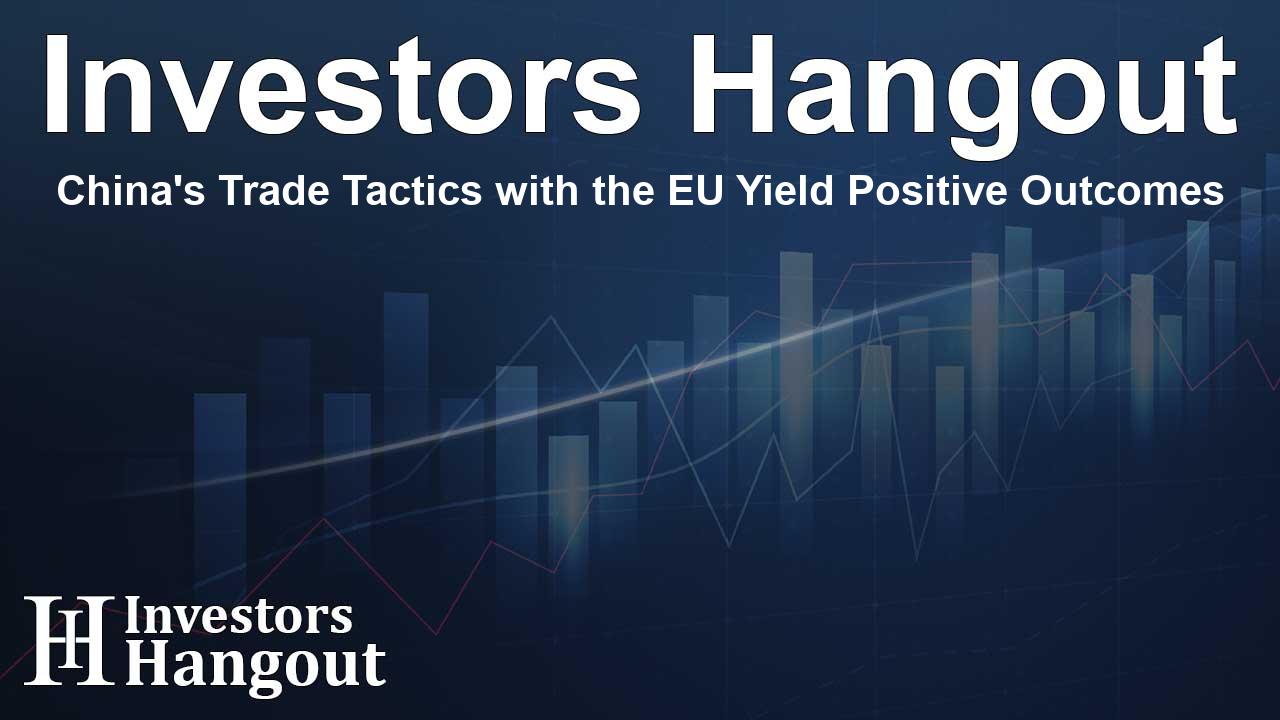China's Trade Tactics with the EU Yield Positive Outcomes

Understanding China's Strategic Trade Approach with the EU
Amid escalating tensions regarding EU duties on electric vehicles imported from China, Beijing has employed a multifaceted carrot-and-stick strategy. This approach aims to sway key EU member states while threatening retaliatory trade measures. As China navigates these complex discussions with the 27-country bloc, the economic stakes are considerable, especially for nations like Spain, France, and Italy, which have shown support for the new EV tariffs.
The nuances of this strategy reveal China's calculated positioning. Specifically, Spanish Prime Minister Pedro Sanchez is notable for his recent engagement with China, where he was seen driving a Chinese electric vehicle. His participation symbolized a shift in tone, with Sanchez advocating for a reassessment of the EU's stance. Reports suggest that his delegation departed from the meeting feeling emboldened, hinting at a possible resolution regarding Spain's key exports, particularly pork.
The Economic Dimensions of China's Trade Relationships
China's trade negotiations are not merely political gestures; they reflect a deeper understanding of the economic interdependencies at play. For the EU, exports such as pork, dairy, and brandy represent significant economic interests, amounting to nearly $10 billion in 2023. These sectors, which are heavily reliant on the Chinese market, are influencing the decisions of Member States regarding the impending tariffs.
Countries less impacted by the proposed tariffs, like Germany, Finland, and Sweden, have tended to advocate against stricter measures. Conversely, for nations like Spain and Italy, the potential financial consequences of counter-tariffs loom large, especially when balanced against their domestic agricultural sectors. With this in mind, China seeks to amplify these considerations when engaging with individual EU governments.
China’s Trade Volume and New Investments
Despite the pressure from U.S. tariffs still affecting China, the country remains intent on avoiding a full-blown trade conflict with the EU. The threat of additional tariffs on Chinese electric vehicles could substantially disrupt trade, as EV exports to Europe soared by 38% last year, totaling around 656,000 units. This substantial growth underscores China's integration into the European market, which contributes over 40% of its total EV shipments.
Moreover, the prospect of a $1 billion investment in Spain for a new hydrogen machinery plant illustrates China's commitment to enhancing its economic footprint in Europe. This move aligns with Spain's aspirations for green technology, suggesting a mutually beneficial agreement that could mitigate trade tensions.
The Importance of EU Unity in Trade Decisions
When considering the fate of the proposed EV tariffs, China requires at least 15 EU countries, which represent 65% of the population, to oppose these measures. However, the diversity of interests across EU members complicates this situation. Smaller states, like Ireland, face challenges due to their limited exports to China, prompting them to prioritize relationships within the EU over extended negotiations with Beijing.
This perspective is echoed by Irish representatives who emphasize the importance of EU solidarity. As one official noted, while China remains pivotal, the complexities of engaging with it pose difficulties. Ireland’s struggles both in the dairy and pork sectors serve as cautionary tales of the interconnected nature of global trade.
Contrasting Approaches to Trade Negotiations
China's differentiated responses illustrate its strategic flexibility. In stark contrast to the EU, which Beijing appears willing to negotiate with, Canada has faced a harsher stance. Following Canada's imposition of tariffs on Chinese electric vehicles, China responded with an investigation into Canadian rapeseed exports. This abrupt move indicates a lack of foresight and multilateral negotiation strategy akin to what is observed with EU relations.
In the case of Canada, officials believe they adhere to a rules-based trading framework. The divergence in treatment highlights how nuanced and context-specific trade relationships can be, with specific nations experiencing distinct diplomatic repercussions based on their economic interactions.
Frequently Asked Questions
1. What is the main strategy China is using with the EU?
China is using a carrot-and-stick approach, balancing threats of trade retaliation with incentives for key EU nations to engage in one-on-one negotiations.
2. Which EU nations are most affected by the potential tariffs?
Nations like Spain, France, and Italy could face significant impacts, particularly in their pork, dairy, and brandy exports to China.
3. How much did China export in electric vehicles to Europe in 2023?
China's EV exports to Europe rose by 38%, totaling approximately 656,000 units in 2023.
4. What are the implications of the $1 billion investment in Spain?
The investment in hydrogen machinery production indicates China's support for Spain's green technology initiatives and could help improve trade relations.
5. How does Ireland view its trade relationship with China?
Irish representatives emphasize the importance of prioritizing the EU market, recognizing that trade with China is challenging and less integral to their economy.
About The Author
Contact Olivia Taylor privately here. Or send an email with ATTN: Olivia Taylor as the subject to contact@investorshangout.com.
About Investors Hangout
Investors Hangout is a leading online stock forum for financial discussion and learning, offering a wide range of free tools and resources. It draws in traders of all levels, who exchange market knowledge, investigate trading tactics, and keep an eye on industry developments in real time. Featuring financial articles, stock message boards, quotes, charts, company profiles, and live news updates. Through cooperative learning and a wealth of informational resources, it helps users from novices creating their first portfolios to experts honing their techniques. Join Investors Hangout today: https://investorshangout.com/
The content of this article is based on factual, publicly available information and does not represent legal, financial, or investment advice. Investors Hangout does not offer financial advice, and the author is not a licensed financial advisor. Consult a qualified advisor before making any financial or investment decisions based on this article. This article should not be considered advice to purchase, sell, or hold any securities or other investments. If any of the material provided here is inaccurate, please contact us for corrections.
